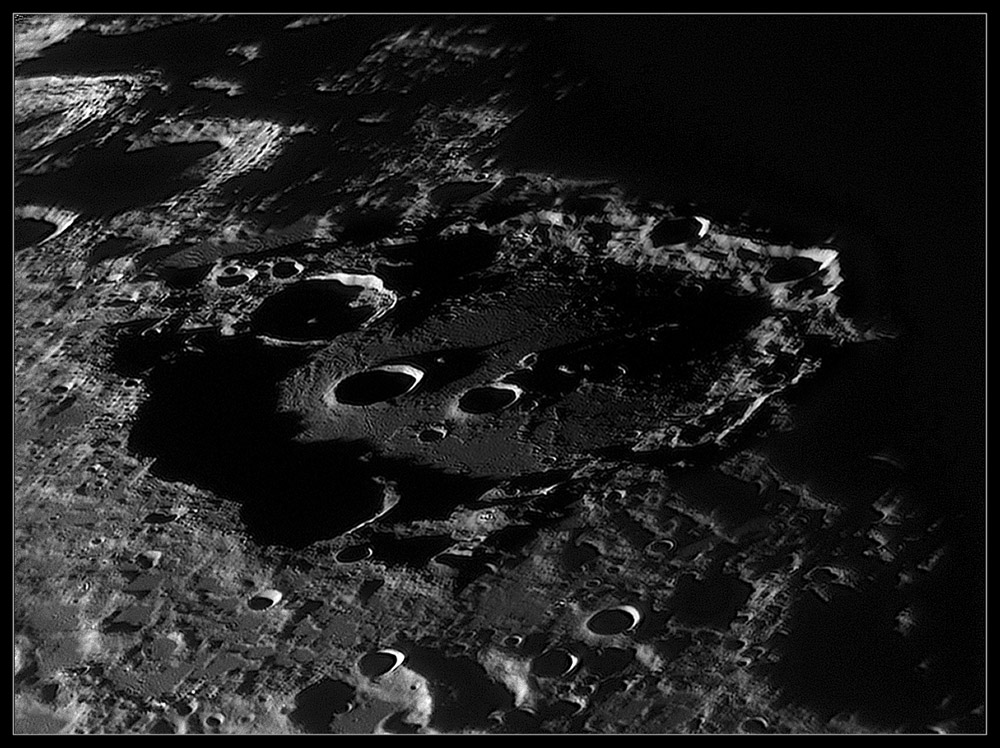Difference between revisions of "May 28, 2013"
| Line 1: | Line 1: | ||
__NOTOC__ | __NOTOC__ | ||
=Ridges, Real And Apparent= | =Ridges, Real And Apparent= | ||
| − | |||
<!-- ws:start:WikiTextHeadingRule:0:<h1> --> | <!-- ws:start:WikiTextHeadingRule:0:<h1> --> | ||
<!-- ws:start:WikiTextLocalImageRule:6:<img src="/file/view/LPOD-May28-13.jpg/434600902/LPOD-May28-13.jpg" alt="" title="" /> -->[[File:LPOD-May28-13.jpg|LPOD-May28-13.jpg]]<!-- ws:end:WikiTextLocalImageRule:6 --><br /> | <!-- ws:start:WikiTextLocalImageRule:6:<img src="/file/view/LPOD-May28-13.jpg/434600902/LPOD-May28-13.jpg" alt="" title="" /> -->[[File:LPOD-May28-13.jpg|LPOD-May28-13.jpg]]<!-- ws:end:WikiTextLocalImageRule:6 --><br /> | ||
| − | <em>south up image by [mailto:dpeach_78@yahoo.co.uk Damian Peach], Selsey, U.K.</em><br /> | + | <em>south up image by [mailto:dpeach_78@yahoo.co.uk" rel="nofollow Damian Peach], Selsey, U.K.</em><br /> |
<br /> | <br /> | ||
| − | The most dramatic views of the Moon are along the terminator, witness this Clavius image captured last month by Damian. In addition to the drama, two features caught my attention. With this lighting there are numerous parallel ridges In the foreground - especially at bottom left. I used my two new lunar globes to see what is in the trend of these ridge, and the answer is nothing, really. These ridges, which are real features that are only noticeably with the right illumination, do not seem to be associated with any impact basin. But they are approximately aligned with the lunar grid pattern that Bob Strom and others mapped in the 1960s and 70s. The second unusual feature is the ripple pattern on the smooth-floored depression between Rutherfurd and Gruemberger. In this image it looks like mare ridge-like features cross the floor. But on the higher Sun LRO [http://target.lroc.asu.edu/da/qmap.html?mv=eqc&mcx=-344468.45808&mcy=-1926246.15457&mz=7 QuickMap] there is no evidence for ripples. Instead, it appears that craters and crater chains create shadows and ridges that my brain misinterpreted. So in the image we see real aligned ridges that don't show up in some other views, and other ripple-like ridges that aren't real. <br /> | + | The most dramatic views of the Moon are along the terminator, witness this Clavius image captured last month by Damian. In addition to the drama, two features caught my attention. With this lighting there are numerous parallel ridges In the foreground - especially at bottom left. I used my two new lunar globes to see what is in the trend of these ridge, and the answer is nothing, really. These ridges, which are real features that are only noticeably with the right illumination, do not seem to be associated with any impact basin. But they are approximately aligned with the lunar grid pattern that Bob Strom and others mapped in the 1960s and 70s. The second unusual feature is the ripple pattern on the smooth-floored depression between Rutherfurd and Gruemberger. In this image it looks like mare ridge-like features cross the floor. But on the higher Sun LRO [http://target.lroc.asu.edu/da/qmap.html?mv=eqc&mcx=-344468.45808&mcy=-1926246.15457&mz=7" rel="nofollow QuickMap] there is no evidence for ripples. Instead, it appears that craters and crater chains create shadows and ridges that my brain misinterpreted. So in the image we see real aligned ridges that don't show up in some other views, and other ripple-like ridges that aren't real. <br /> |
<br /> | <br /> | ||
| − | <em>[mailto:tychocrater@yahoo.com Chuck Wood]</em><br /> | + | <em>[mailto:tychocrater@yahoo.com" rel="nofollow Chuck Wood]</em><br /> |
<br /> | <br /> | ||
<strong>Technical Details</strong><br /> | <strong>Technical Details</strong><br /> | ||
| Line 16: | Line 15: | ||
Rükl plate [http://the-moon.wikispaces.com/R%C3%BCkl+72 72]<br /> | Rükl plate [http://the-moon.wikispaces.com/R%C3%BCkl+72 72]<br /> | ||
<em>[http://lpod.wikispaces.com/21st+Century+Atlas+of+the+Moon 21st Century Atlas]</em> chart 15.<br /> | <em>[http://lpod.wikispaces.com/21st+Century+Atlas+of+the+Moon 21st Century Atlas]</em> chart 15.<br /> | ||
| − | Damian's [http://www.damianpeach.com/index.htm website] and Facebook [https://www.facebook.com/peachastro page] (with recent images of Moon, Jupiter and comets).<br /> | + | Damian's [http://www.damianpeach.com/index.htm" rel="nofollow website] and Facebook [https://www.facebook.com/peachastro" rel="nofollow page] (with recent images of Moon, Jupiter and comets).<br /> |
<br /> | <br /> | ||
<hr /> | <hr /> | ||
Revision as of 22:46, 4 January 2015
Ridges, Real And Apparent

south up image by " rel="nofollow Damian Peach, Selsey, U.K.
The most dramatic views of the Moon are along the terminator, witness this Clavius image captured last month by Damian. In addition to the drama, two features caught my attention. With this lighting there are numerous parallel ridges In the foreground - especially at bottom left. I used my two new lunar globes to see what is in the trend of these ridge, and the answer is nothing, really. These ridges, which are real features that are only noticeably with the right illumination, do not seem to be associated with any impact basin. But they are approximately aligned with the lunar grid pattern that Bob Strom and others mapped in the 1960s and 70s. The second unusual feature is the ripple pattern on the smooth-floored depression between Rutherfurd and Gruemberger. In this image it looks like mare ridge-like features cross the floor. But on the higher Sun LRO " rel="nofollow QuickMap there is no evidence for ripples. Instead, it appears that craters and crater chains create shadows and ridges that my brain misinterpreted. So in the image we see real aligned ridges that don't show up in some other views, and other ripple-like ridges that aren't real.
" rel="nofollow Chuck Wood
Technical Details
April 19, 2013. C14.
Related Links
Rükl plate 72
21st Century Atlas chart 15.
Damian's " rel="nofollow website and Facebook " rel="nofollow page (with recent images of Moon, Jupiter and comets).



